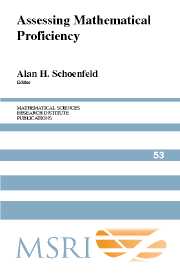Book contents
- Frontmatter
- Contents
- Preface
- Acknowledgments
- Section 1 The Big Picture
- 1 Issues and Tensions in the Assessment of Mathematical Proficiency
- 2 Aims of Mathematics Education
- 3 The No Child Left Behind Act: Political Context and National Goals
- Section 2 Perspectives on Mathematical Proficiency
- Section 3 What Does Assessment Assess? Issues and Examples
- Section 4 The Case of Algebra
- Section 5 What Do Assessments Assess? The Case of Fractions
- Section 6 The Importance of Societal Context
- Epilogue: What Do We Need to Know? Items for a Research Agenda
- About the Authors
- Subject Index
- Author Index
- Task Index
3 - The No Child Left Behind Act: Political Context and National Goals
Published online by Cambridge University Press: 06 July 2010
- Frontmatter
- Contents
- Preface
- Acknowledgments
- Section 1 The Big Picture
- 1 Issues and Tensions in the Assessment of Mathematical Proficiency
- 2 Aims of Mathematics Education
- 3 The No Child Left Behind Act: Political Context and National Goals
- Section 2 Perspectives on Mathematical Proficiency
- Section 3 What Does Assessment Assess? Issues and Examples
- Section 4 The Case of Algebra
- Section 5 What Do Assessments Assess? The Case of Fractions
- Section 6 The Importance of Societal Context
- Epilogue: What Do We Need to Know? Items for a Research Agenda
- About the Authors
- Subject Index
- Author Index
- Task Index
Summary
This is an important moment, a time when the United States government has articulated the expectation that all U.S. students will learn mathematics. The No Child Left Behind Act (NCLB) is a bipartisan commitment to the children of the United States. It has a fundamental premise: Adults in our schools and communities must take responsibility for ensuring that all students develop the fundamental knowledge and skills in mathematics, as well as in all core subjects, that will enable them to succeed in the twenty-first century. In order to achieve this goal, NCLB draws on four basic principles: Accountability for results, local control and flexibility, choice, and research-based practice.
Accountability. Accountability for results has taken on a new dimension for educators, one which some are not eager to embrace. Not only are teachers, principals, and superintendents responsible for student performance in the aggregate, but, for the first time, they are responsible for the performance of subpopulations of students. The performance of students of color and of different ethnicities must be examined separately to ensure that all are making progress toward the standards their state has set. Achievement in English language acquisition and mathematical knowledge must be measured for students who are not fluent speakers of English. In some states, mathematical knowledge is assessed in the students' home language; in others, it is assessed in English. Students in poverty constitute a distinct group whose achievement must be assessed and improved over time.
- Type
- Chapter
- Information
- Assessing Mathematical Proficiency , pp. 23 - 28Publisher: Cambridge University PressPrint publication year: 2007
- 1
- Cited by



